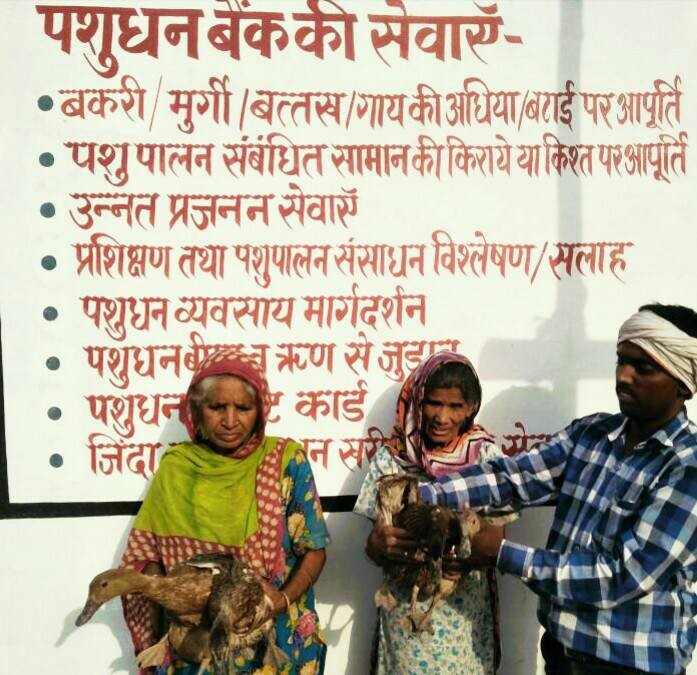Peer to peer Shared Livestock farming Platform
Background and need
Livestock begets livestock. Livestock like goats/sheep/Poultry/ Bovines is such an asset which produces multiple livestock within a specified time as per their gestation period. So investment in livestock has potential to multiply asset value. Smaller livestock like goats/Sheep/Pig/Poultry producer higher number of off springs.
India has over 10 million poor farmers engaged in livestock and 60% of such small livestock farming families have labour as prime assets. Rural women due to their multiple engagements and household responsibilities find livestock farming as a supplementary income source well suited to their daily chore.
Only 4% livestock farmers are able to access mainstream credit facilities and due to monthly repayment schedule, it does not fit to livestock farming cash flows. Besides risk of non productivity or low productivity in loan based farming totally rests with livestock farmers. Lending institutions did not get any incentives of providing livestock business services as interest rates are fixed in beginning and higher productivity has no direct reward to lenders.
Most of urban based middle income group people wishes to start goat/pig/poultry farm with sole aim to get better return on their investment as they find higher number of off springs will multiply their investment quickly. Although it’s true that small livestock like goats can produce 2 to 4 kids (Depends on breeds) , they often forget the fact that its very labour intensive and cost of labour and ownership by labour is critical factor for success besides a significant skills & management is required to earn profits.
So we find , there is on one hand middle class population having investment capacity in the arrange of 1 to 5 lakh and on the other hard working rural families who have skills but no investment to scale or purchase livestock.
In this context an age old trading of leasing or shared farming seems a win- win proposition, wherein willing investor purchases livestock like Goats, sheep, pig & poultry and provides is to a trained resource constraint poor families. Rural families take care of such livestock (Say for example goats) and shares 50% of born kids with livestock provider on annual basis.
Concept
N.N Breeds & Seeds India Pvt Ltd ( A sister concern of The Goat Trust) is launching such a platform where any person willing to invest as low as Rs 6500 can purchase a livestock at Pashubajaar.com and provide it to a poor family (List available) and gets yearly return of off springs. Livestock giver can sale such kids to pashubajaar.com as per body weight pricing table. Livestock remains the property of livestock giver and can be monetized as per rate assessment by Pashubajaar.com.
Producer sharing mechanism
Produce like kids born are shared after 90 days of birth (Weaning stage) as 50%. For Example, if two kids are born – one male and one female , their weight are taken at 90 days and prevailing live body weight (LBW)rate is applied , suppose male is 10 kg and female is 8 kg at 90 days and rate per kg decided is Rs 250 for male and Rs 200 for female , total value is Rs 10*250+ 8*200 equals Rs 4100, so Rs 2050 for farmer and livestock giver. Now if farmer keeps male of value Rs 2500, he has to pay Rs 450 to livestock giver or vice versa. Similarly if farmer keeps female kid, s/he will get Rs 450 from Livestock provider.
However Livestock giver provides cost of insurance, 50% feed cost (only concentrate as per estimation made) and medicine costs. Farmers major cost is labour for grazing , management cost. Pashubajaar.com charges cost of managing whole process as 20% of asset value I year 1 and fixed charges of Rs 500 per year thereafter and provides all data transparently to both Livestock provider and livestock rearer. Other livestock products like milk, dung are used and kept by farmers.
Methodology & working process
Any willing livestock provider register at our website. S/he chooses amount for investment as per products available. S/he can purchase a particular kind of livestock as per value mentioned from www.pashubajaar.com. Once purchased, S/he can select a farmer available in the list. Once farmer (Largely rural women) is selected s/he provides livestock to those particular families. Pashudhan bank does the ground execution of process within 15 days and shares photo of families with provided livestock and related materials as per package defined.
Monthly status of livestock is shared with livestock provider. Once kids are born and it completes 90 days, owner is provided choice to select sharing model and owner can sale such kids to pashubajaar.com and realize his/her cash, while goats are still owned by him/her. Owner based on his needs can anytime decide to sale mother goats and get out of this business.
Product economics livestock provider
For investment in goats per goat annual return of 32% (First yr 16%) is expected to Livestock provider , however it depends on productivity and may get higher if goat produces as on average more than 2 kids per kidding (20% probability in prolific breeds). There are additional social return of helping a poor family to be an entrepreneur and earn significantly under managed risks.
Economics of goat leasing

